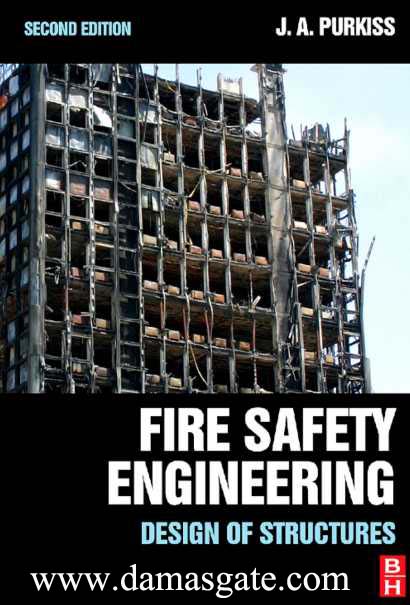Fire Safety Engineering

Fire Safety Engineering
Design of Structures
Second Edition
John A. Purkiss
BSc(Eng), PhD
Consultant,
Formerly Lecturer,
School of Engineering and Applied Science,
Aston University, UK
Preface to the second edition
Since the publication of the First Edition of this book, substantial progress
has occurred in Structural Fire Safety Engineering which has necessitated
the production of a Second Edition. However, the author must report
the death of two personally influential figures noted in the acknowledgements
to the first edition, namely Bill Malhotra and Tony Morris, and the
retirement of the third, Bob Anchor.
The intention behind this text remains provision to those involved in
aspects of the design of structures to withstand the accidental effects due
to fire occurring within part or the whole of the structure and of the
tools required to enable such a design to be carried out. One of the major
revisions is that the author has concentrated on the European Design
Codes rather than British Standards which will in the course of the next
five years become effectively obsolete. However, the designer should still
be aware that any design code is subject to revision or amendment and
that it is essential that the most recent edition be used, and that where
this produces a discrepancy between this text and the Code, the Code
must be taken as the final arbiter.
The second major revision has been due to the impact of the largescale
fire tests carried out at Cardington. This has meant there has had
to be a re-assessment of the behaviour of composite steel–concrete frame
structures, in that the whole structure performance markedly outweighs
that of single elements. Equally, there are a number of guides produced
by either the Institution of Structural Engineers or the Building Research
Establishment promoting Structural Fire Safety Engineering.
The best available texts were used for the EuroCode material as some
of the EuroCodes had not at the time when this text was prepared been
finally approved or released by CEN (Comité Européen de Normalisation)
for publication by the appropriate National Standards Organization. It is
thus possible that there might be discrepancies between this text and the
final published EN versions of the EuroCodes. It is hoped such variations
are slight and will mostly be concerned with interpretive matters or
notation and not basic principles.
Download
http://s18.alxa.net/s18/srvs2/01/Fir...ngineering.rar